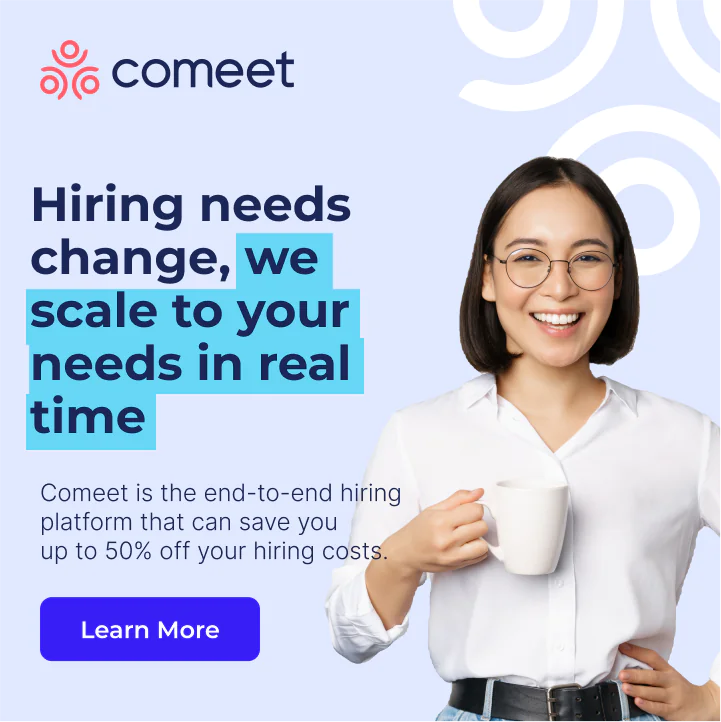If you’re looking to grow your business, it’s worth considering how recruitment processing outsourcing (RPO) can free up valuable resources. While it’s an investment, the ROI can be significant. Whether you’re looking to bring on a few new hires or staff an entire office, here’s what you should know about the pros and cons of RPO providers.
Pros of RPO services
There are numerous benefits to keep in mind when you outsource your hiring needs to expert recruiters. The most notable perks include the following:
1. Scalable, adaptable resources
Businesses have a natural ebb and flow in their hiring volume. A reliable RPO team can anticipate these changes and work within their existing framework to accommodate your needs. They’re able to prepare for forecasted growth or decline, and they can respond quickly to unforeseen changes in your staffing needs.
2. Positive candidate experiences
The grievances among candidates sound similar these days, and bad communication and inconsistent interviews are the most common. Since your hiring reputation can be a big part of your overall brand reputation, you can’t afford to get it wrong. Using a high-quality RPO company can build those excellent candidate experiences into your process, so you’re only known for the good things—and not the bad.
3. Leading-edge innovation
Long gone are the days when you had to guess about what works in your recruiting process. With more tools and software available to keep communication consistent, you can appear to be a well-oil machine, even in your most trying seasons. Team members also have new ways to communicate and stay on track, thanks to scheduling, texts, social media, and AI innovations. While you can’t be expected to know everything that’s out there, an RPO can and will know the right tools for the job.
4. You can focus on your core business
How long is the average interview? What could you be doing with that time? If hiring makes you feel less productive than you could be, it’s time to reclaim some of those hours (and days) to refocus on your own core competencies. Outsourcing the talent acquisition process makes sense for anyone who has started to resent their role in candidate sourcing and onboarding. This is particularly true with startups where you and other team members may be wearing multiple hats.
5. Better candidates
When you let expert recruiters do the sourcing and vetting, there are two significant advantages and they’re both related to quality. First, they know what’s new in recruiting and have seen the type of applicants each platform or method produces. They can focus on those that get the best applicants and save time overall. Second, they won’t have the same biases that you and your teams have, which means more balanced hiring decisions. This alone can help you get the type of qualified candidates you say you want but may not have the ability to recognize.
6. Meaningful insights
What do metrics have to do with hiring? Quite a bit, actually. With data showing what’s working (and what’s not) in hiring, getting better outcomes may be a matter of a few tweaks in the process. An RPO team is skilled in finding these inefficiencies and adjusting just what’s needed to make the hires more suitable for your needs.
Cons of RPO services
Not everything about outsourcing is wonderful, and there are a few trade-offs to consider before you take the plunge.
1. Cultural clashes
Since the RPO doesn’t work in-house with your employees every single day, they aren’t fully immersed in the culture of your business. While this doesn’t mean they can’t get it right with the hires they bring on, there is a real risk of a mismatch between your core mission and values and the talent they hire. To prevent conflict, give the RPO team everything they need to understand your unique culture and ensure it’s reflected in their candidate pipeline.
2. Ramp-up time
The RPO team may be better at the business of hiring, but they could possibly miss some nuanced industry insights that only someone working in your business could understand. Some tech, finance, or specialized legal industries may have specific needs that the average RPO team could overlook. Getting them up-to-speed is necessary, but it can take time. If you foresee having a long-term and fruitful relationship with your RPO service, factor in this warm-up period to make sure they fully understand your industry’s needs.
3. Long-term buy-in
Even if you work in a familiar industry for the recruitment agency, there’s an onboarding period that should be reflected in your hiring plan. They need to know your preferences, past successes, and even former failures so that they can do the best job possible. All of this takes time, so the decision to partner with a recruitment team should be a committed one that lasts a year or more (at a minimum). It may also take some buy-in from your boss, which is its own process.
4. Giving up some control
If you are the type who must have your eyes on every hiring email and be in the room for every candidate interview, reaching out to an RPO service provider may feel painful at first. Remember, they do this for a living, and they are poised to make every moment count in the hiring process. Once you see the time and resources they can free up for you, it will likely get easier to let go. In the meantime, ask questions so you can have the full reassurance that they will treat your business like their own.
5. Lack of communication
Now that you’ve let some of these things go, you may not always get an update on every moving part in the hiring process. That’s to be expected, but it also means that things could possibly get lost in translation. To ensure that the service provider is consistently communicating your brand message and upholding company culture, consider scheduling regular status reports and check-ins with the team. Metrics and reporting can also fill in gaps and help you get the bigger picture of success without cumbersome emails and conference calls.
Summary
The benefits of a RPO plan are clear and numerous, especially for any companies interested in scalability that may not have the internal team and resources to handle it. While there are some potential downsides to keep in mind, they’re also easily solved for as you build out and refine your hiring processes.
Want to know more about how an RPO like Comeet can change the way you hire? Get in touch with us and schedule a free demo today!





























